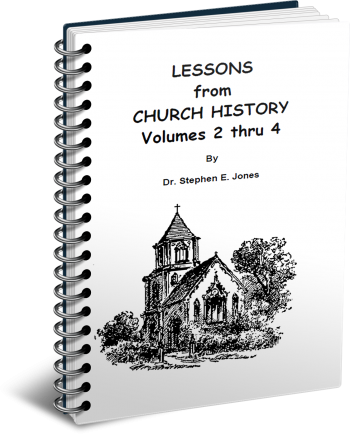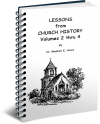Latest Posts
View the latest posts in an easy-to-read list format, with filtering options.

Volumes 2-4. This is the history of the Church from the Roman War (66-73 A.D.) to Constantine and the Council of Nicea in 325 A.D. with lessons to be learned from it.
Category - History and Prophecy

King Saul thought that the fact that he had been anointed king—by divine appointment—meant that he was called to rule as he thought fit and that he could do so with immunity from divine prosecution. But we read in 1 Sam. 13:13, 14,
{1 Samuel 13:13} 13 And Samuel said to Saul, “You have acted foolishly; you have not kept the commandment of the Lord your God, which He commanded you, for now the Lord would have established your kingdom forever. {1 Samuel 13:14} 14 But now your kingdom shall not endure. The Lord has sought out for Himself a man after His own heart, and the Lord has appointed him as ruler over his people, because you have not kept what the Lord commanded you.”
In other words, Saul’s calling was conditional upon his obedi-ence to God. God had not called a king to do as he pleased.
The same principle applied also in the priesthood calling. Just before Saul came to the throne, Eli the high priest had died. A prophet had told Eli in 1 Sam. 2:30,
{1 Samuel 2:30} 30 Therefore the Lord God of Israel declares, “Did I indeed say that your house and the house of your father should walk before Me forever [olam, “indefinitely”]?” But now the Lord declares, “Far be it from Me--for those who honor Me I will honor, and those who despise Me will be lightly esteemed.”
Here is a good example, by the way, of how the Hebrew word olam means a time whose length is “concealed,” or an indefinite period of time, rather than “forever.” God had given his ancestor Phinehas “an everlasting priesthood” (Num. 25:13). If that word had literally meant “everlasting” in the modern sense, then God would have broken His word by removing it from the family of Phinehas and giving it to Zadok in 1 Kings 2:27, 35. (Abiathar was the last high priest of the lineage of Phinehas.)
The transfer of calling from the dynasty of Phinehas to the dynasty of Zadok in the reign of Solomon was a type and shadow of the greater transfer from the Levitical priesthood to that of Melchizedek (Melchi-Zadok). That priesthood was actually older than Levi, for it represented all true believers from the beginning. Shem was the Melchizedek priest in Abraham's day (Gen. 14:18), and David himself was called to the same priesthood (Psalm 110:4). Finally, Jesus was called according to that Order as High Priest (Heb. 5:5, 6).
The point to understand in this is that the Old Covenant and its Levitical priesthood, along with the old Jerusalem and its physical temple—the religion established by Moses by divine revelation and calling—was not immune to losing its calling. Just because the religion could claim Moses as its founder, and a dynasty of priests divinely anointed and called, did not mean that God had to put up with their rebellion for all time. Far from it. They did indeed lose their authority, even as Saul and the Phinehas priesthood lost their authority.
Likewise, the Church itself was subject to the same rules. The Roman Church claims Jesus and/or Peter as its founder, and it claims divine authority forever on that basis. But if that principle were true, then the Jewish claim would take precedence over Rome, for they could claim superiority through Moses and his genuine God-given authority.
The fact is, however, that the Church under Pentecost is a manifestation of King Saul, the king who was crowned on the day of wheat harvest, or Pentecost (1 Sam. 12:17). This is proven by the simple fact that the Church has acted like Saul at least from the third century. Church history is largely the history of Church rebellion against God--much like the account of King Saul. It is not a legitimate argument for Rome to claim authority over the earth forever—even if their claim were true that Peter founded the Roman Church.
The Roman Church has ruled during most of the Pentecostal Age, but Pentecost is a leavened feast and is therefore imperfect. The Roman Church is a reversion to a priesthood patterned after the Levitical priesthood, though men may call it “Melchizedek.” But there is a greater priesthood that God has called from the beginning. It is the true Melchizedek Order. This is not the priesthood of any particular religion or religious organization—even if it calls itself Christian. It is not a matter of being the member of some earthly organization. Like David, “The Lord has sought out for Himself a man after His own heart.” It is a matter of the heart.
Throughout the time of the Old Testament, the prophets were persecuted, stoned, and killed as false prophets. Then in later years, monuments were erected to them, and they were venerated even as they continued to kill the prophets of their own day (Matt. 23:29-37). This was done by the authority of the priests in Jerusalem. Likewise, King Saul persecuted David and attempted to kill him for many years.
Are we to say, then, that the prophets were excommunicated from a covenant relationship with God—just because the priests had excommunicated and stoned the prophets? Are we to say that David was outside of the Kingdom of God just because King Saul had put him on the Most Wanted list of criminals? Of course not. God had a relationship with David and the prophets that was INDEPENDENT of the established priesthood. God maintained His relationship with these outcasts in spite of what the priesthood did or said about them.
This, then, proves that the decrees of the king and the excommunications of the priests have no effect when done in rebellion against God. The priesthood has no power to write any man's name in the Lamb's Book of Life. The priesthood has no power to determine any man's status with God. The function of priesthood is to BEAR WITNESS to what God is doing—not to tell God what to do. The extent of its authority is to bear witness to the truth—not to determine truth.
As long as the priesthood functions in submission to God, it will seek to know the will of God and will then bear witness to His will by saying AMEN. But when the priesthood usurps the authority of God, it is manifested in the idea that they have the authority to decree and expect God to say AMEN to their decrees.
Though Victor (189-198) was the first to assert Papal supremacy, Cyprian (248-258) set forth the idea that the Church was in the bishop and the bishop in the Church, and when he insisted that a Christian was a Christian only when he was in agreement with the bishop. In this assertion he reached the apex of Saul's rule and Eli's theology. In time, as the Roman Church consolidated its authority, all priests and bishops were expected to perpetuate this usurpation of authority. It was believed that salvation could come only within the boundaries of the organizational Church, which had usurped the position of the True Church—pictured in the type as David, the “man after God's own heart.”
Over the years, the Roman Church had its share of competitors. Some of them started out well enough, but it was only a matter of time before many of them claimed that their organizations were the “True Church.” And so they proved to be mere competitors for the throne of Saul, for they did not understand that the True Church was not the organizational (or visible) Church. Those who teach that their organization is the True Church have usurped the authority of God. They must repent of this (change their thinking), seeking instead to make their Church organization bear witness of the True Church.